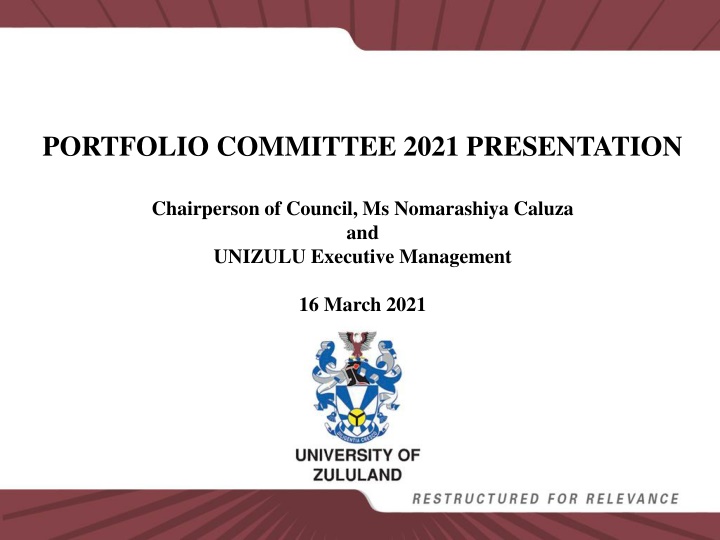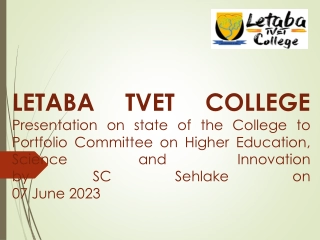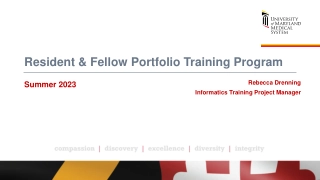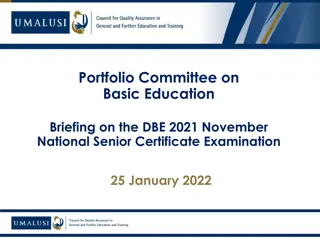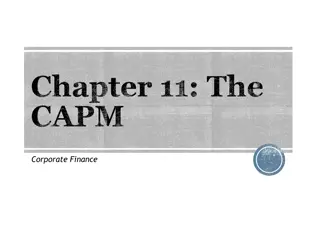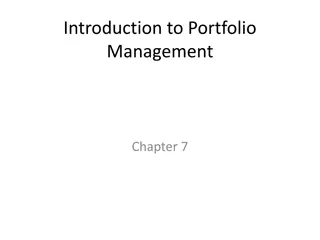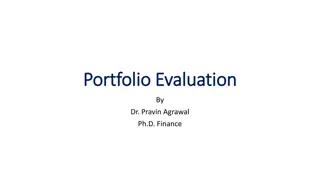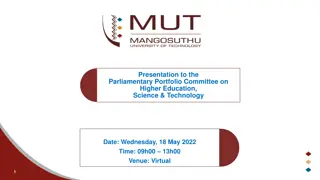Governance and Management Overview at Portfolio Committee 2021 Presentation
The presentation at the Portfolio Committee 2021 highlighted the governance and management practices at UNIZULU. It covered aspects such as council structure, compliance with laws and standards, risk governance, ethics, and transformation initiatives. The university's commitment to accountability, monitoring, and strategic planning for sustainability and transformation was emphasized.
Download Presentation

Please find below an Image/Link to download the presentation.
The content on the website is provided AS IS for your information and personal use only. It may not be sold, licensed, or shared on other websites without obtaining consent from the author.If you encounter any issues during the download, it is possible that the publisher has removed the file from their server.
You are allowed to download the files provided on this website for personal or commercial use, subject to the condition that they are used lawfully. All files are the property of their respective owners.
The content on the website is provided AS IS for your information and personal use only. It may not be sold, licensed, or shared on other websites without obtaining consent from the author.
E N D
Presentation Transcript
PORTFOLIO COMMITTEE 2021 PRESENTATION Chairperson of Council, Ms Nomarashiya Caluza and UNIZULU Executive Management 16 March 2021
PRESENTATION OVERVIEW Governance and Management Teaching and Learning During Lockdown Student Performance Statistics and Success Rates Infrastructure Development Projects Finances and Audit Outcomes NSFAS Disbursement Readiness of 2021
GOVERNANCE AND MANAGEMENT OVERVIEW (Continued) COUNCIL & COMMITTEES Delegations and Oversight Statutory Compliance Duly Constituted Council (60/40) and Committees (23 positions, 3 vacancies) Independent and skilled Chairpersons to Chair all Committees Charters in place (Council and Committees) ARCC Comprising only external members internal/external auditors' invitation Code of Ethics monitored by ARCC Inductions ongoing Continuous Assessment DHET Scorecard Delegations Policies (Council to Committees; Council to VC; VC to Senior Management) Vice-Chancellor and Management in place Accountability and monitoring conducted by ARCC Strategic Plan, Annual Performance Plan and Mid-Year reporting in place and monitored Performance Management in place reporting on organizational achievement
GOVERNANCE AND MANAGEMENT OVERVIEW (Continued Compliance with laws, codes, rules and Standards Risk Governance Leadership, Ethics & Corporate Citizenship Decisions, actions and deliberations were conducted with sensitivity to the legitimate interests and expectations of all shareholders. Decisions, actions and deliberations were conducted with sensitivity to the legitimate interests and expectations of all shareholders. The University is fully compliant with all laws, codes, rules and standards applicable to higher education and its operations in general An Enterprise-wide approach to Council understands the triple context in which the University operates economy, society and environment risk management is applied and a Risk Management Framework, Strategy and Policy is in place. Strategic Plan, and operational planning - aimed at ensuring that UNIZULU remains sustainable and promotes transformation Transformation - integral part of Strategy Internal Risk Management Committee and MANCO monitors divisional risk registers. Council understands the triple context in which the University operates economy, society and environment No refusals to information made - Promotion of Access to Information Act, 2000 Strategic Risk Register in place monitored by ARCC and Council Strategic Plan, and operational planning - aimed at ensuring that UNIZULU remains sustainable and promotes transformation Compliance with POPI Incorporating IFRS Standards Anti-fraud Initiatives Whistleblowing Hotline Transformation - integral part of Strategy No material or immaterial but often repeated regulatory penalties, sanctions or fines for contraventions or non-compliance with statutory obligations were imposed on the Institution during the year under review. Council is not aware of any key risk current, imminent or forecasted that may threaten the sustainability of the University. Council leads ethically, effectively and governs the University in a manner that supports the establishment of an ethical culture.
GOVERNANCE AND MANAGEMENT OVERVIEW (Continued) Business Continuity and Information & Technology Governance Online requisition implemented on ITS Finance iEnabler ICT strategy, framework and policies are actively implemented and monitored. UNIZULU has made significant strides in its commitment to maintaining systems of internal control over financial reporting and the safeguarding of assets against the unauthorised acquisition, use or disposal thereof. ITS Integrator 4.1 upgrading enabling online registration Business Continuity Plan (BCP) and Disaster Recovery Plan (DRP) implemented. Partitioning of new ODI Server - mitigate some cybersecurity risks Accepted standards are applied to protect privacy and ensure control over all data, including disaster recovery and back up procedures. Enterprise Resource Planning (ERP) system in place - aimed at paperless transactions Full implementation online Residence booking system. Service Management software (HEAT) was implemented to manage the IT Service delivery 50% of the ICT HDI Grant committed to Infrastructure Management System. Despite this, inherent limitations to the effectiveness of any system of internal control, including the possibility of human error and the circumvention or overriding of controls, exists. Staff capacity development as student training conducted. Moodle upgrades enables the university to track student s performance through automated learning analytics procedures; Accordingly, even an effective internal control system can provide only reasonable assurance with respect to financial statement preparation and the safeguarding of assets. Furthermore, the effectiveness of an internal control system can change according to circumstances. CCTV monitoring system reviewed tender for integrated surveillance system Higher Degrees Management System (HDMS) implemented
GOVERNANCE AND MANAGEMENT OVERVIEW (Continued) REPORTING OUTCOME EVIDENCE OF ACHIEVEMENT Good Governance Show that Council has fulfilled its agreements with DHET. Evidence of stable governance, good internal controls, quality, sustainability and achievement of Strategic Goals. Corporate Citizenship Accountable Annual Report Balanced Student Life Sustainable and Viable Quality Academic Offerings Strategic Direction - Performance Internal Controls and Quality
2. TEACHING AND LEARNING DURING LOCKDOWN INSTITUTIONAL READINESS FOR MULTIMODAL APPROACH COMPLETION OF THE 2020 ACADEMIC YEAR University Readiness For Online Teaching And Learning: LMS: Moodle Upgrade from version 2.4 to version 3.9, with 4 different instances (one for each faculty). Including features such as learner analytics, Interactive content, plagiarism detection, learner collaboration Revision of the academic calendar to ensure that activities were not compromised
TEACHING AND LEARNING (Continued) STAFF READINESS FOR MULTIMODAL APPROACH Faculties received extensive support for dynamic educational experience: Converting face-to-face courses into online materials : instructional design resources and workshops/webinars. 1. Instructional Design (Beginner and Interim) 2. Educational Technologies (Beginner) These are some of the training that academics participated in: Instructional Design and Educational Technology Training 6 April 2020 Phase One Basic Moodle Training (facilitated by TLC 29 April 2020) Phase Two Big BlueButton Training (facilitated by TLC 6 May 2020) AAU Emergency Remote Teaching Webinar 1-4 (April and May) UNIZULU Virtual Learning Henley Business School -13 May 2020 Faculty support groups and LMS champions: LMS, Google Docs, Dropbox, OneDrive, Office 365 Web-conferencing: Zoom, MsTeams E-Learning Committee chaired by the Director of Information and Communication Technology (ICT) where lecturers who are champions of online teaching and learning represent all Faculties. Workshop for support staff to assist during multimodal teaching and learning
TEACHING AND LEARNING (Continued) STUDENT READINESS FOR MULTIMODAL APPROACH Analytics: Student Usage of LMS: 1. Since the nationwide lockdown 88% of students have accessed the LMS. 2. Student usage during the first week two weeks of July has dropped to 83% During the last term of 2020 participation on Moodle increased Provision of laptops and data: 10G Day and 10G Night data Preparation and printing of hard copy study material, packing and sorting of study material, Delivery of study material Material delivered to 59 different delivery points on predetermined dates WhatsApp groups per delivery site, bulk sms, phone call before delivery
TEACHING AND LEARNING (Continued) STUDENTS RETURN TO CAMPUS: PHASED-IN PROCESS Level 3: in a staggered way Return of 94 Nursing students from Faculty of Science on 29 June 2020 The 40 final year BCom (MIS) students, returned due to their need for specialized software and a practical online assignment and assessments; 20 Postgraduate students in FCAL who require specialized software packages only available on campus, including econometric software and big data sets 7 SAICA Interns in the FCAL to assist Accounting and Auditing students Level 2: September 2020 14 BSC Honours in Biokinetics students: 38 MSc and PhD students Conditions and obligations attached to their return: Letter of invitation Permit Covid-19 Indemnity and Code of Conduct Teaching and Learning and Social orientation.
TEACHING AND LEARNING (Continued) ASSESSMENT STRATEGIES AND UNDERPINNING PRINCIPLES Types: Fully Online Examinations Take Home/Open Book exams Formative Assessments Portfolios (long essays, critical reflection, etc.) Laboratory based examinations Principles: Quality not to be compromised. Question papers were moderated to ensure that they were of good standard Flexibility - to accommodate different learning styles Student access to and participation in exams - 80% - 100% participation rates across faculties Adequate support to staff and students throughout the exam period Assessment types: Test-Based, Task-Based, and to some extent Self-, peer- and group assessment, recorded presentations, artifacts, voice notes, portfolios, slideshows, reflective video responses, written responses, data interpretation and analysis
TEACHING AND LEARNING (Continued) MANAGEMENT OF EXAMS Support to staff and students w.r.t. Online exams ICT Helpdesk was set up to provide support to students LMS and server upgrade was done by TLC Support to academics was provided by faculty champions and TLC Server monitoring was done by TLC and consultant Monitoring of University network was done by ICT Daily submission of examination reports by Faculty Deans to the DVC and Registrar to monitor and address student challenges Exams successfully completed on 5 February 2021
TEACHING AND LEARNING (Continued) EXAMINATIONS Successful online examination conducted on the Moodle LMS Platform Unprecedented participation by students on online examinations Improved pass rates noted
3. STUDENT ENROLMENT AND SUCCESS STATISTICS 2020 ACCESS - HEADCOUNT TOTALS 2020 Target (2020) Actual (2020) 20000 17920 18000 17143 15912 15548 16000 14000 12000 10000 8000 6000 3823 3518 4000 1800 1595 2000 450 370 0 First-time entering undergraduates Headcount enrolments Headcount enrolments (Foundation Provisioning) Headcount enrolments total UG Headcount enrolments total PG
ENROLMENT AND SUCCESS STATISTICS (Continued) MAJOR FIELD OF STUDY 2020 Target (2020) Actual (2020) 6000 5186 5000 4671 4598 4481 4358 4324 3739 3706 4000 3000 2000 1000 0 Science, engineering, technology Business/management Education Other humanities
ENROLMENT AND SUCCESS STATISTICS (Continued) STUDENT DEREGISTRATION 2020 2020 Number of headcount undergraduate students registered in 2020 15,709 Number of headcount undergraduate students that deregistered in 2020 (cumulative) 161 Number of remaining undergraduate headcount registered students 15,548 Number of headcount postgraduate students registered in 2020 1,618 Number of headcount postgraduate students that deregistered in 2020 (cumulative) 55 Number of remaining postgraduate headcount registered students 1,563
ENROLMENT AND SUCCESS STATISTICS (Continued) SUCCESS RATES / PASS RATES 90% 80% 70% 60% 50% 40% 30% 20% 10% 0% 2018 2019 2020 Success rate Target 84% 83% 85% 80% 80% 83%
ENROLMENT AND SUCCESS STATISTICS (Continued) SUCCESS RATES / PASS RATES BY CESM FACULTY 90% 80% 70% 60% 50% 40% 30% 20% 10% 0% 2018 2019 2020 Faculty of Arts 90% 87% 90% Faculty of Commerce, Administration & Law Faculty of Education 81% 78% 81% 90% 76% 80% 89% 77% 80% 90% 77% 83% Faculty of Science and Agriculture Target
ENROLMENT AND SUCCESS STATISTICS (Continued) GRADUATION TRENDS 2014 - 2020 4400 4280 4267 4252 4300 4200 4105 4100 3996 4000 3859 3900 3800 3700 3700 3600 3500 3400 2014 2015 2016 2017 2018 2019 2020
4. READINESS FOR 2021 ACADEMIC YEAR (Continued) REGISTRATION 1- 19 March Registration of FTENs and returning students Registration period has been extended FIRST YEAR STUDENT ORIENTATION 23 27 March (focusing on Multimodal learning skills) COMMENCEMENT OF TEACHING AND LEARNING 29 March for FTENs 15 March for returning students University has provided data for teaching and learning Faculty online-seminars for research progress presentations to support postgraduate students
5. INFRASTRUCTURE DEVELOPMENT PROJECTS UniZulu s Spatial Development Framework is the main point of reference in regard to infrastructure planning and development Master project list of refurbishments and new construction projects made up of 2021 priorities Implementation Plan and List of Priority Projects Procurement Strategy is in place First Implementation Target Date: July 2020, revised severally to September 2020, November 2020, January 2021, and finally March 2021.
INFRASTRUCTURE DEVELOPMENT PROJECTS (Continued) PROJECT IMPLEMENTATION TIMELINE (AS AT DECEMBER 2020) CONSTRUCTION WORK PACKAGE STAGES AT 11 DEC 2020 Packages 1, 2, 3, 8.1: Student Accommodation Package 4.1: Student Centre READINESS FOR CONSTRUCTION March 2021 May 2021 Package 6: Richards Bay Engineering Building Package 7.1: Multi-purpose Conference Facilities August 2021 August 2021 Package 7.2 : University Main Entrance Upgrade and Modernisation May 2021
INFRASTRUCTURE DEVELOPMENT PROJECTS CONSTRUCTION WORK PACKAGE STAGES AT 11 DEC 2020 Package 8.2: Refurbishment of the Main Administration Building Package 9.1: Implementation of projects linked to the Water & Sewer Masterplan Package 9.2: Implementation of projects linked to the Roads & Storm water Masterplan READINESS FOR CONSTRUCTION May 2021 March 2021 Due to the potential damages caused by Construction vehicles on the roads, the implementation will be done later. March 2021 Package 10.1: Implementation of projects linked to the Hot Water Masterplan Package 10.2 Implementation of projects linked to the Electrical May 2021 Subject to Availability of Funding.
INFRASTRUCTURE DEVELOPMENT PROJECTS (Continued) RISKS CAN ACKNOWLEDGED Extended Lockdown (implications of availability of human resources, construction materials, equipment, and cost implications) Procurement (longer periods than anticipated) Disruptions: Community and student protests Bulk infrastructure and services from the municipality a key success factor in the rollout of implementation plan integration in plans between the university and uMhlathuze municipality is essential.
6. FINANCES AND AUDIT OUTCOME 2020 TUITION FEES 2020 Historically University of Zululand tuition fees have been very low when compared to other universities. The University did an analysis which illustrates the material difference in tuition fees between University of Zululand and comparable universities in the public higher education sector. For the University to fulfil its responsibilities towards its stakeholders and to remain financially sustainable there is a need to review the fee baseline of the University of Zululand.
FINANCES AND AUDIT OUTCOME 2020 (Continued) TUITION FEES 2020 UNIZULU Tuition Fees 2020 Fees for other Universities % Baseline correction needed Average other universities 2020 2020 UFS RHODES UNIVEN UKZN UJ NMU UFH ARTS Average tuition 52% 26,944 40,916 34,585 48,157 34,933 47,140 42,176 38,860 40,562 COMMERCE, ADMINISTRATION & LAW 47% Average tuition 26,944 39,499 37,985 52,687 32,328 42,455 34,318 36,160 40,562 SCIENCE AND AGRICULTURE 68% Average tuition 26,944 45,383 43,825 52,687 41,550 44,814 52,721 45,837 36,249 EDUCATION 29% 183% BEd PGCE 30,288 12,623 39,200 35,716 32,800 19,110 48,095 39,262 37,383 61,020 36,521 26,102 - 41,006 38,030 45,910 40,562 22,890 HONOURS Cost of degree over 1 year 12,623 173% 34,479 34,805 44,403 25,430 34,979 47,910 30,930 22,899 MASTERS Year 1 Each subsequent year thereafter 6,851 3,689 243% 417% 23,514 19,088 15,025 15,025 24,208 24,208 31,060 15,660 31,167 15,589 18,968 18,968 21,270 21,270 22,899 22,899 PHD Year 1 Each subsequent year thereafter 6,851 3,689 235% 394% 22,923 18,221 10,375 10,375 24,208 24,208 34,490 17,160 31,167 15,589 18,968 18,968 25,670 25,670 15,580 15,580
FINANCES AND AUDIT OUTCOME 2020 (Continued) NSFAS 2020
FINANCES AND AUDIT OUTCOME 2020 (Continued) AUDIT AND FINANCES 2020 The 2019 audit was an unqualified audit opinion The audit for the 2020 financial year is still being performed, scheduled for reporting on 30 June 2021 as per Reporting Regulations. Budget vs actual 2020 Income R1 173 million (budget) vs R1 198 million (actual) Recurrent expenditure R1 153 million (budget) vs R1 040 million (actual) The University Council approved a breakeven budget for 2021 which included a downward operational budget adjustment (cut) The University is in a sound financial position but there is the risk of the influence of the Covid-19 related impact on income and expenditure
FINANCES AND AUDIT OUTCOME 2020 (Continued) REGISTRATION 2021 Students are not required to make a minimum initial payment to register All 2021 funded students register regardless of outstanding debt As per Council resolution payment plan arrangements are made for unfunded students with outstanding debt and this has been implemented very successfully in the past ensuring access for students As part of the multimodal approach to teaching and learning, the University has also made provision for laptops for all first years
